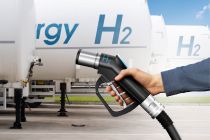 Three employees of the Polish Geological Institute – National Research Institute: Marek Jasionowski, Marcin Łojek and Krystian Wójcik participated in the "Hydrogen in the energy transformation" workshop, which was organized by the Chamber of the Natural Gas Industry (IGG) on October 21-23, 2024 as part of a study trip to the Kingdom of the Netherlands.
Three employees of the Polish Geological Institute – National Research Institute: Marek Jasionowski, Marcin Łojek and Krystian Wójcik participated in the "Hydrogen in the energy transformation" workshop, which was organized by the Chamber of the Natural Gas Industry (IGG) on October 21-23, 2024 as part of a study trip to the Kingdom of the Netherlands.
During the workshops, the PGI-NRI delegation, together with representatives of other companies from the Polish hydrogen industry, had the opportunity to see the technologies of hydrogen production and commercial use of this fuel... including, of course, the drivers of hydrogen cars…
…and at the beginning, it is worth to conclude the visit to emphasize the context of the activities undertaken by our Institute in the field of hydrogen market. Every modern economy, including both – old and emerging – markets of the European Union, needs the clean energy sources. Hydrogen is slowly becoming the most important one. The widespread availability of water – the raw material necessary for generation, as well as the various methods of production mean that hydrogen is beginning to be perceived not only as an alternative engine fuel, but as an energy storage: a special type of battery, which charges much faster than, for example, a conventional lithium one. After all, the aim is to store electrical energy in a battery/fuel cell so that they can power a device, e.g. a car.
Let’s talk about the visit to the Netherland, however. Its first point it was the hydrogen production installation of XINTC Electrolysers, in Kootwijkerbroek. The installation obtains electricity from a 14-hectare photovoltaic farm located nearby. XINTC has developed a technology that enables the production of hydrogen thanks to a modular (multi-core) gas system, which allows the electrolysis and its efficiency to be adjusted to the amount of energy supplied directly from the photovoltaic panels, which is crucial in constantly changing sunlight conditions. The gas modules are made of plastic, which allows to avoid the use of critical raw materials. Hydrogen production takes place at atmospheric pressure, then the gas passes through a compressor, where it reaches a pressure of 20 bar and undergoes 90% purification of water vapor. Depending on the assumed target purity and its pressure (350 or 700 bar), the gas is fed to subsequent compression/purification processes. The cost of obtaining a kilogram of hydrogen in this process oscillates between €15-16. It is not difficult to see here the huge possibilities of hydrogen production in this way also in Poland. Especially if we pay attention to the development of renewable energy sources, the construction of large-scale photovoltaic farms or wind farms, which are increasingly common in our landscape. Installing hydrogen production modules on such investments would enable, at least partially, energy storage, instead of its immediate distribution to the energy system and, as a consequence, the need for immediate consumption.
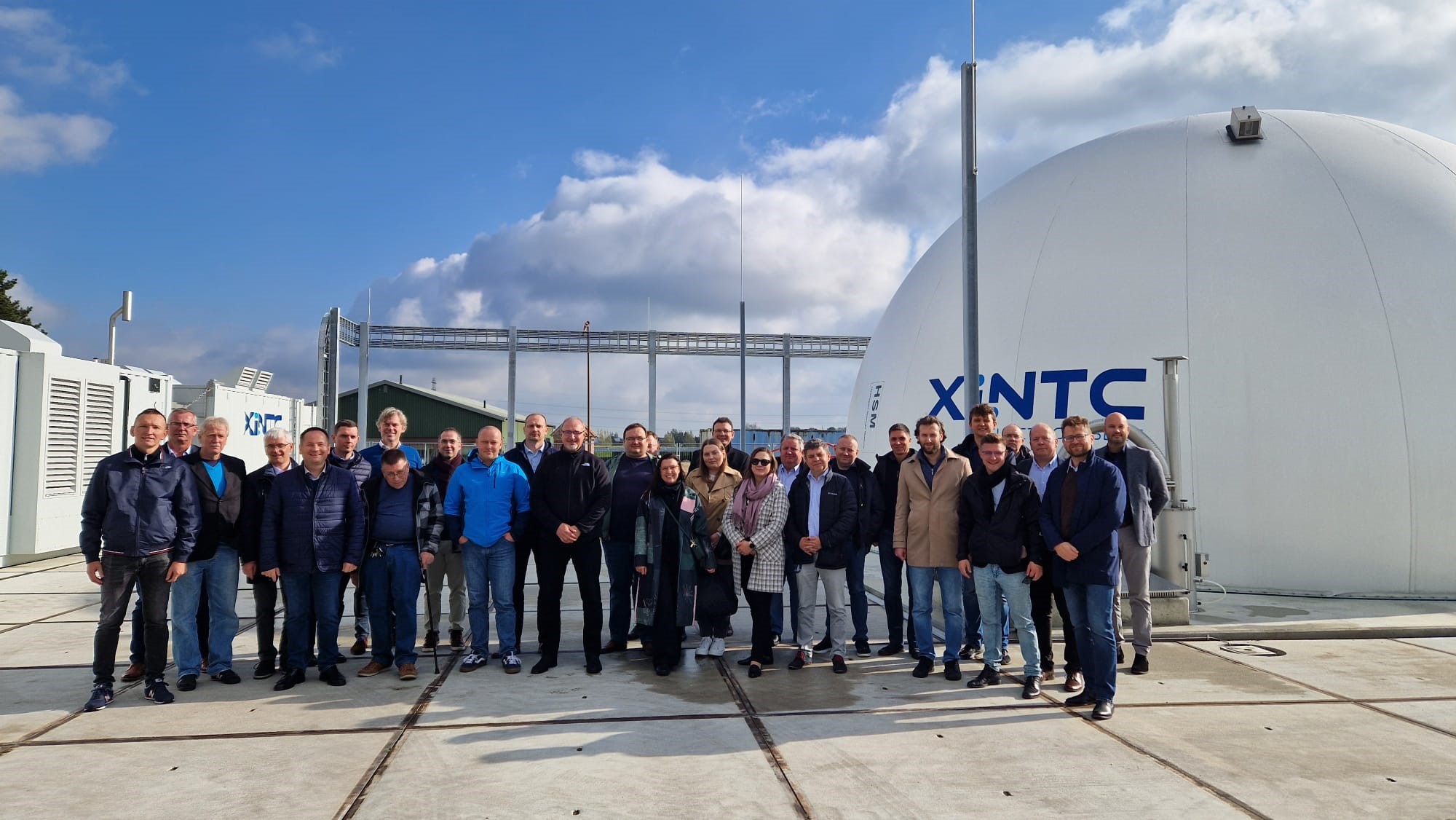
Participants of the "Hydrogen in energy transformation" workshop in the XINTC Electrolysers hydrogen farn. In the background, container stations with installations for hydrogen production by electrolysis of water using photovoltaic energy and a low-pressure hydrogen tank, from where the gas is transported to compressors, dryer and condenser. Photo: IGG
During the second day of the visit, the delegates visited the facilities of the Resato company in Assen, near Groningen (the city is also known for having the largest natural gas field in Europe). For several years, Resato, originally focused on high-pressure technologies in the oil and water processing/stone cutting sectors, has been dynamically developing its hydrogen branch. The company builds and sells complete hydrogen fuel stations, using its experience in the high-pressure sector. Resato stations are also operating (or will soon be operating) outside the Netherlands, including Germany, Belgium, Sweden, Estonia and Poland. To give an idea of the scale and consumption, one of the stations visited by the delegates in Groningen allows to refuel around 80 cars, 10 buses and several trucks per 24h. The station can distribute 1,000 kg of hydrogen per day, while one passenger car refuels an average of around 4–6 kg at a cost of €19.95/kg. The company's stations can be supplied with hydrogen produced on-site by electrolysis and/or brought in from outside. The compressor module increases the gas pressure to a maximum of 950 bar, so that the vehicle can be refuelled quickly (700 bar for passenger cars, 350 bar for buses and trucks). The company's headquarters in Assen houses the assembly plant for compressor modules.
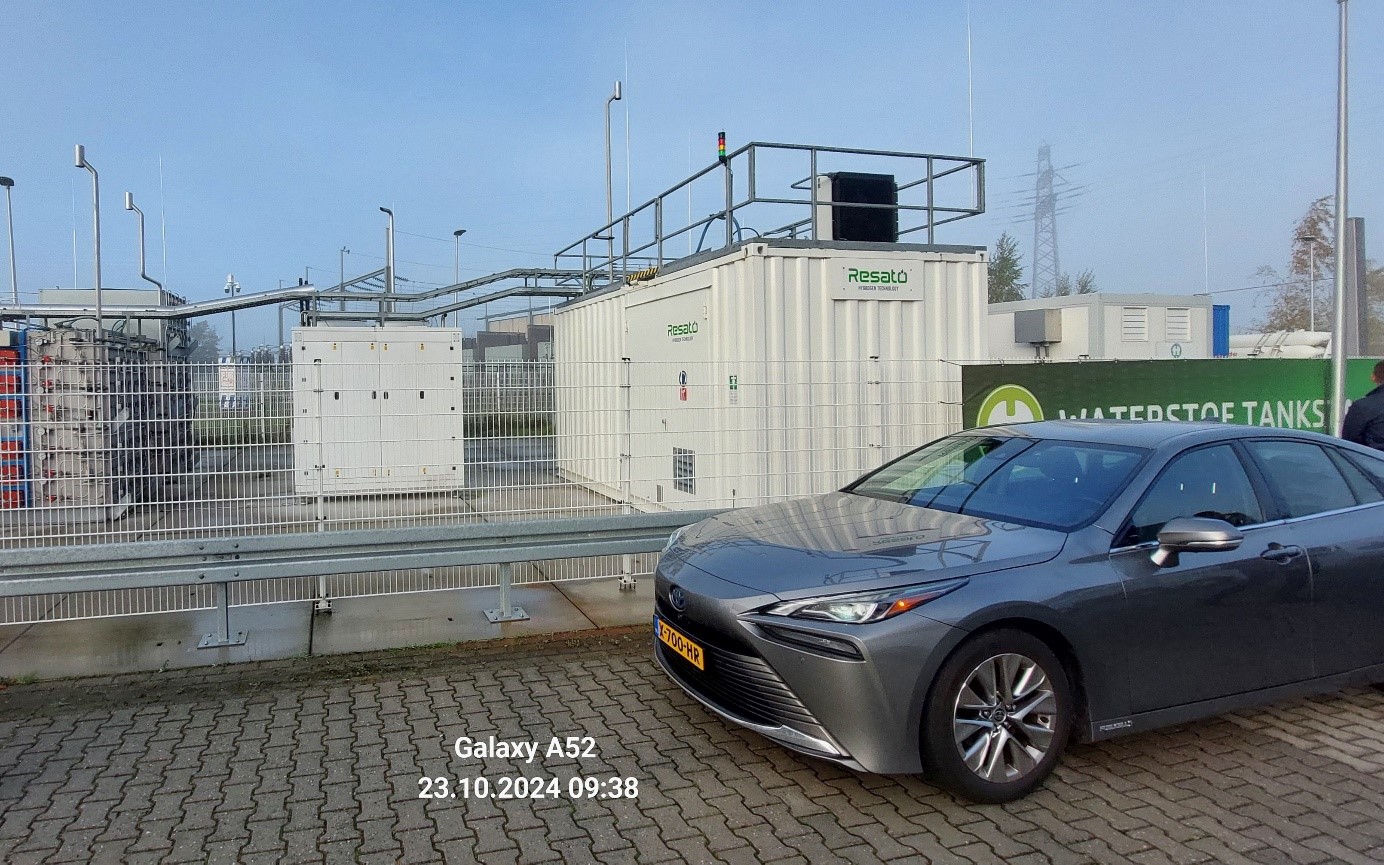
Hydrogen station facilities (compressor module) in Groningen – Resato modules. In the foreground see Toyota Mirai powered by hydrogen. Photo: Marek Jasionowski
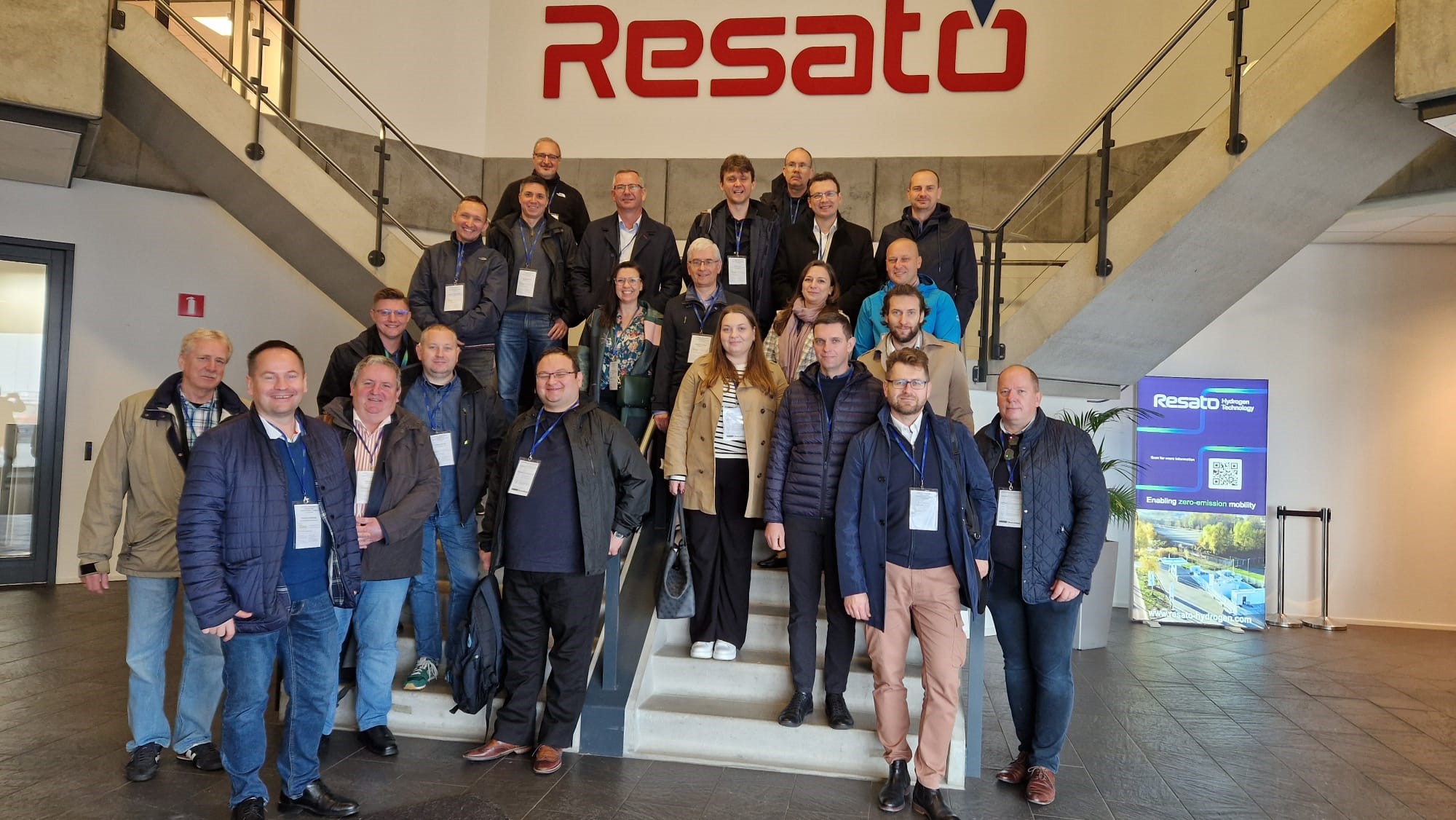
Workshop participants at the Resato headquarters in Assen. Photo: IGG
The study visit to the Kingdom of the Netherlands was attended by representatives of state offices, research institutes, producers and distributors of hydrogen in Poland. Our common challenge is to ensure the largest possible supply of hydrogen on the market. PGI-NRI employees, taking up this challenge, will try to recognize the occurrence and economic potential of white hydrogen, i.e. hydrogen accumulated in the earth's crust, which, alongside green, yellow, purple or blue hydrogen, is also clean for the environment. This work will be carried out as part of the tasks of the Polish Geological Survey – a pioneering project, the first results of which are expected in 2 years. Discovering natural hydrogen deposits also requires the involvement of many research institutions and industry, and it is a huge scientific and economic challenge. This is noticed by PGI-NRI, AGH University of Science and Technology, Mineral and Energy Economy Research Institute of the Polish Academy of Sciences and ORLEN S.A., which a few days ago, on October 18, 2024, concluded a cooperation agreement establishing GeoHydrogen – Polish Initiative for Natural Hydrogen (see more here: https://www.pgi.gov.pl/aktualnosci/display/15710-pig-pib-czlonkiem-geo-hydrogen-czyli-polskiej-inicjatywy-na-rzecz-naturalnego-wodoru.html).
The participation of the PGI-NRI delegates in the study trip to the Kingdom of the Netherlands was financed from the National Fund for Environmental Protection and Water Management. The workshops were organized by the Chamber of the Natural Gas Industry (IGG ) – an organization whose activities cover the gas fuel sector, including the full chain of production and use of gases (including hydrogen) for energy and industrial purposes. The Chamber’s cooperation with scientific units and industry creates a unique space enabling comprehensive and effective implementation of innovative solutions in the sector.
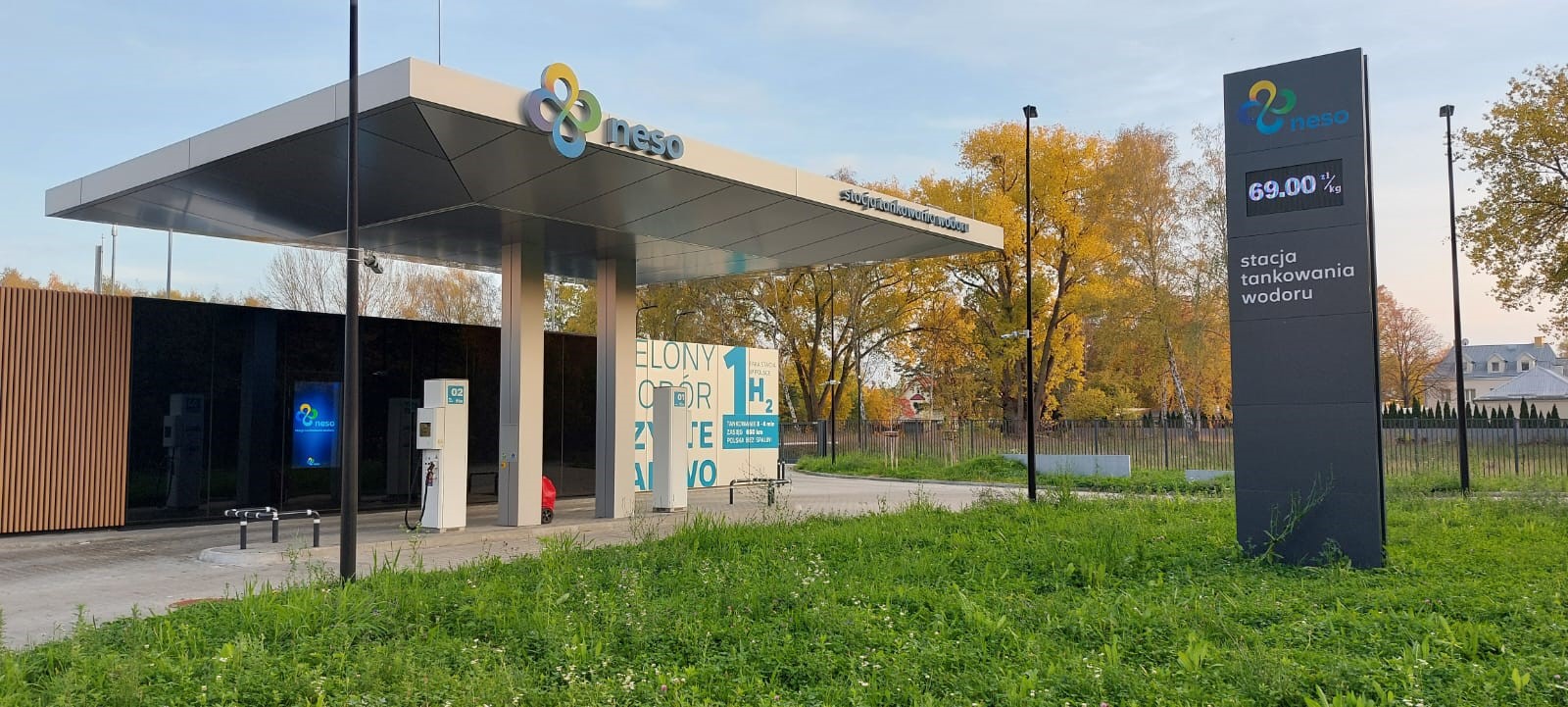
Afterword. …Polish hydrogen station on Tango Street in Warsaw. Photo: Marek Jasionowski
Text: Krystian Wójcik, Marcin Łojek, Marek Jasionowski
Photos: Marek Jasionowski, IGG
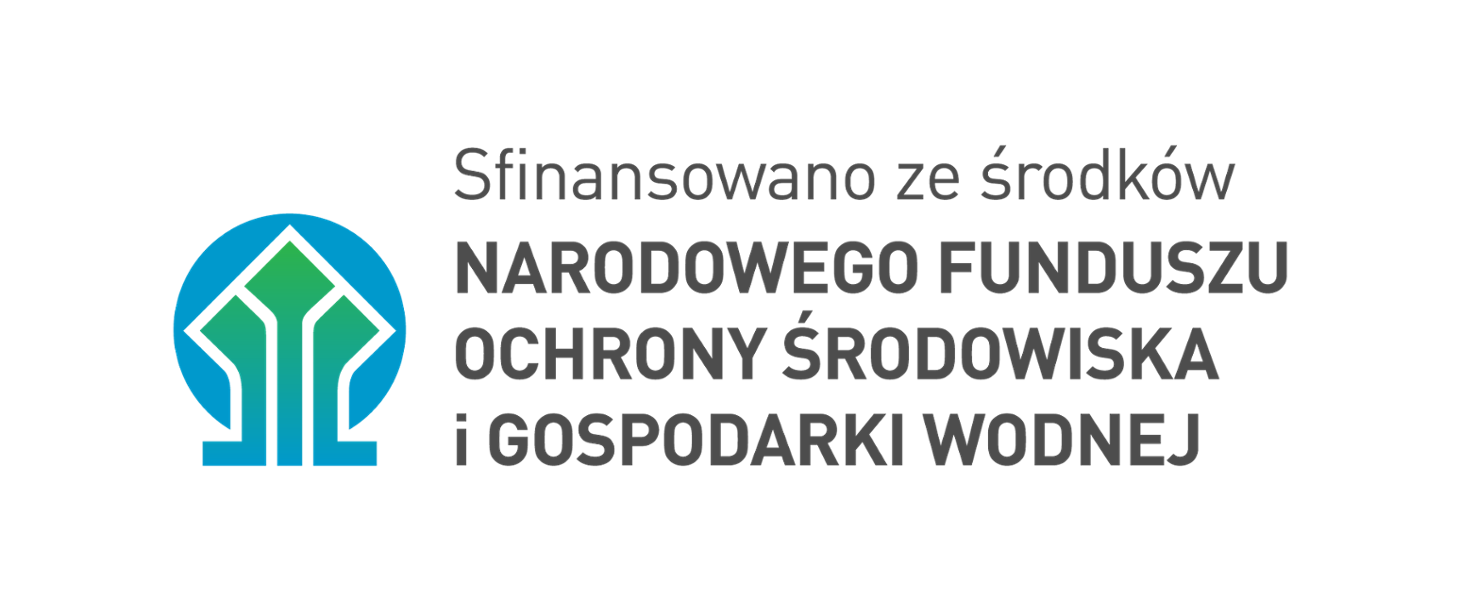















 PGI-NRI offer
PGI-NRI offer Mineral resources of Poland
Mineral resources of Poland  Oil and Gas in Poland
Oil and Gas in Poland 



 Subscribe to RSS Feed
Subscribe to RSS Feed